Eyes Wide Shut
Narrative Analysis
The Intro
Welcome to my analysis of Eyes Wide Shut by Stanley Kubrick. Eyes Wide Shut was Kubrick’s famous final film, starring Tom Cruise, Nicole Kidman, and Sydney Pollock. It was released in 1999, one of the greatest years in American cinema history.
Eyes Wide Shut is also famously debated as a Christmas movie. And so with the two guys at 241 Studios, we decided to make Eyes Wide Shut our Christmas movie for analysis this year. You can watch the podcast below and read my breakdown and analysis. Happy Holidays and Merry Christmas!
As always, these breakdowns contain SPOILERS, and are only recommended if you've already seen the movie. You can check my introduction to these breakdowns, to get an overview of my process and philosophy.
Feel free to let me know what you think in the comments below!
The Basics
Director: Eyes Wide Shut
Writers: Stanley Kubrick and Frederic Raphael based on the novel by Arthur Schnitzler
Release Date: 1999
Runtime: 159 Minutes
IMDB:https://www.imdb.com/title/tt0120663/?fc=1;ft=21
Movie Level Goals
Protagonist: Bill Harford
External: Explore sex outside of marriage
SUCCESS | FAILURE | MIXED
He does explore a wide range of possibilities, but never actually has sex outside his marriage
Internal Goal: Learn to be honest and truthful about sex with his wife
SUCCESS | FAILURE | MIXED
Goal Relationship: External leads to Internal. He must go out into the world and see all the various side of sex and find out what happens when his wife discovers his attempt, for him to understand the importance of being open about desire.
Three Observations
Feel free to watch my video, or read the (lightly) edited transcript below.
Observation #1: The Lack of a True Inciting Incident
Unlike most movies, Eyes Wide Shut lacks a sole inciting incident. Now you might argue, well, it's a Stanley Kubrick movie, and his movies tend toward the art cinema side, and maybe that's just a more common thing for those kinds of movies. Well, it certainly can be common for an art cinema movie not to have a true inciting incident, but a lot of art cinema movies do have an inciting incident. Also, in a lot of ways, this really isn't a typical art cinema movie. It does have a lot of Hollywood aspects to it. It made over $150 million at the box office, so it was a very popular movie.
Normally, the inciting incident is one event that interrupts the status quo of our main character, our protagonist, and takes their life and swerves it off into a different direction. In this movie, of course, our protagonist is Bill, played by Tom Cruise. The set of things that happen to him are more a group inciting incident rather than an individual inciting incident.
So, we first meet Bill and Alice. We get to know them a little bit, and then pretty quickly, we're finding out that they are going to a party hosted by either a friend of Bill's or a patient of Bill's named Victor Ziegler. A number of things happen at this party, each of which can be considered part of an inciting incident, but I don't think any one of them is the full inciting incident. So, we have four different things that happen.
The first is that Bill meets his old medical school chum, Nick Nightingale, who is playing piano at this party. The meeting, in and of itself, doesn't really do a whole lot in the moment, but it does lead to Bill seeking Nick out later at a piano bar, where he finds out about the sex orgy party that Nick is playing at, and of course, leads to a lot of the troubles that Bill has in the second half of the movie.
The second part of the inciting incident is that Bill is flirting with two models at the party, and his wife Alice notices this. We have the third inciting incident, which is that Alice is dancing with and being propositioned by a suave Hungarian aristocrat who, of course, wants nothing more than to get her upstairs into a private place in order to have sex with her. Both Bill and Alice notice their partners flirting with the other people, and this becomes a big part of the conversation that Alice initiates with Bill at the end of the first act.
And then we have the fourth aspect of the inciting incident, which is the overdose of Mandy, a prostitute hired by Victor Ziegler. She does a mixture of cocaine and heroin. She's passed out, and Victor panics and asks Bill to come upstairs. Bill is able, without really doing too much, to sort of bring Mandy back to consciousness. Mandy becomes aware of Bill. In and of itself, this moment doesn't do a lot, but it introduces the idea of sex, especially sex with negative consequences, and of course, Mandy will come back to play a large role in the movie in later acts.
So, together, none of these four things by themselves spark the movie or get Bill off his status quo, but all of them together help create the conditions that drive the rest of the movie forward. Specifically, Bill and Alice each flirting with their respective non-partners is a big part of what initiates Alice's conversation with Bill in which she confesses to having fantasies or having had a fantasy of hooking up with a naval officer that she met while they had been on vacation. That then, of course, sparks Bill into quite an adventure that involves both Nick and Mandy in important roles, which if he hadn't met those two, those things either might not have happened or would have happened in a very different way.
Observation #2: Five Acts
The second observation I'd like to make about Eyes Wide Shut is that it has five acts. Five acts might be common in theater. Hamlet has five acts, for example. But in the world of cinema, not too many movies have five acts. When we get to long movies, and this movie is just over two and a half hours, we often tend to be in big blockbuster Marvel Adventure Land, The Avengers and stuff like that, and we tend to have sequence structure rather than act structure. However, in this sort of slow-boiling drama that has a little bit of mystery, a little bit of thriller aspects, we do still have a traditional act structure. It's just that because the movie is two and a half hours long, we end up with five acts.
Now, five acts can be challenging to write. It's really hard to write acts that have new and different goals for every act, and as great as Eyes Wide Shut is, part of what we can see here, especially in the middle acts, acts two, three, and four, is that the goals sometimes tend to be very similar. So, if you look at my chart on The Hutch Files and you look at acts two, three, and four, you see that they do have kind of similar and somewhat overlapping act goals.
After Alice's confession about the naval officer, Nick gets a phone call and he leaves in order to go visit the daughter of a patient who has just died. And I think while he's out, he develops his act-two goal, which is to figure out what to do about Alice's confession. Is he going to respond sort of in kind by perhaps cheating or having an affair on Alice? Is he going to let that go? He keeps having imaginations and thoughts about what that encounter might have looked like. And so I think over the course of act two, he's trying to figure out what to do. At one point, it seems like he has decided to cheat with the prostitute Domino, but Alice calls right before it's about to happen. It guilts Bill, and he decides not to have the affair. So, he ends up at the end of act two having chosen not to cheat. But also, at the end of act two, he meets Nick Nightingale, who tells him about the sex orgy party that he's going to play piano at, and Bill decides he wants to attend this party. So, he gets the information from Nick, and that leads us into act three.
And so act three becomes about pursuing and attending this cult sex party. That is really his goal, I think, to look for sex. He has decided that he is going to pursue this, so act two's goal, I think, does lead into act three's goal, but those goals are different goals. Act two's goal: he's figuring it out. Act three, he chooses to act upon it. He attends the sex party, the orgy, but he's initially recognized as an outsider. He's warned multiple times by a mysterious woman who seems to end up being the woman Mandy, who we met in the first act. He's then caught by the leaders of this party, who warn him to stay away and not to come back. And, in fact, Mandy, seemingly—maybe it's a put-on, maybe it's not—agrees to sacrifice herself to perhaps save his life. So, at the end of this act, he escapes the sex party. This leads us to act four, where perhaps it seems like he's willing to give up on pursuing sex outside his marriage, but he goes home and he notices Alice having a dream in which she is laughing. She wakes up and admits to having a dream where she was at an orgy having sex with a lot of men. She acts ashamed of this, but it's unclear what exactly she's ashamed of or if she's really ashamed at all and it's just a put-on for Bill.
The main result is that Bill seems to rekindle his goal of seeking out sex outside of the marriage, and much of the rest of that act is about him doing just that. He does a number of things to try to get the goal of having sex outside of marriage, although he fails at all of them. He also begins to look into and investigate the cult, perhaps because he wants to be a member of it, or perhaps because he wants more information. This is interesting because that ends up becoming our fifth act goal, especially after he finds out about the overdose death of Mandy.
So, the goals in those three middle acts, two, three, and four, are differentiated to some extent, but especially the act three goal and the act four goal have some similarities.
Observation #3: Bill’s Failures
That leads us to the third observation that I want to make, and that's about the way characters pursue goals, especially at the scene levels. Usually, characters have a lot of mix of success and failure, and Bill does too. He's successful in a lot of the things that he does. He needs a costume, he gets it. He wants the address to the party, he gets it. He wants to find out more about what happened to Mandy at the hospital, he finds out. He wants access to the morgue, he gets it. He does get a lot of things because he's this great, charming guy. But the thing he seems to want most of all is sex. He wants to have sex outside his marriage.
And the funny thing about this movie is that he fails every single time that he tries to do this, and I think this is a really fascinating thing about what Eyes Wide Shut is trying to do. So, just to run quickly through that list, of course, in the beginning, when he's flirting with the models, whether he really is going to act upon that at the party or not, I think we can safely assume that in some ideal world, he might be able to have sex with them. Later on, after he's wandering the streets, after he's left his patient's bedside, where he's gone to visit the daughter of a patient who has passed away, he has an encounter with a prostitute named Domino, who invites him to her room to have sex. It seems like he's going to go through with it, and then at the last minute, Alice calls. He's not able to do it. He then goes to the sex party, where it seems pretty clear that he would be willing to have sex there if the opportunity arises, but he is caught and unable to do so. It seems like he's given up on that goal, and then the goal returns after Alice tells him about her dream of participating in an orgy. So, he calls Marian, who is the daughter of his patient who's passed away, but Marian isn't in. Her fiancé answers, and so that line of sex is now gone. So, what does he do next? He goes to Domino's apartment. Well, Domino's not home, so he is unable to have sex with her. However, he meets her roommate Sally, and he potentially is going to have sex with Sally, who also seems to be a prostitute. But then she gives him the news that Domino has tested positive for HIV, and that pretty much ends Bill's attempts to have sex. We might also mention that Bill might have the dream of having sex with his own wife. He does seem to have sex with her in the first act, but none of the rest of the times that he might be able to have sex with her or want to have sex with her is he able to.
So throughout this movie, whether it's an act goal or whatever, he does seem to have this goal of having sex outside of his marriage. And interestingly, especially for the character being played by Tom Cruise, he fails at this. And I think this is a key part of what the movie is trying to do. In a way, the universe does not want him to cheat. It does not want him to be an adulterer. It does not want him to have sex outside of marriage. At the end of the movie, when he finally returns home after many of these adventures, he discovers that Alice has found his mask from the sex orgy party. He immediately breaks down and admits everything to her, and perhaps it saves their marriage because they both agree that if their marriage is going to stay together, they need to be true and honest and open with each other about their own sexual desires. And so, in order for them to get to that point, and for us, frankly, to have a happy ending in this movie, Bill really does have to fail at all of these attempts to have sex.
So, I think what the interesting lesson and an interesting thing about this is that Bill's constant failures to have sex actually lead to success at the end of the movie in terms the more internal goal of having a stronger, more trusting, more open relationship with his wife.


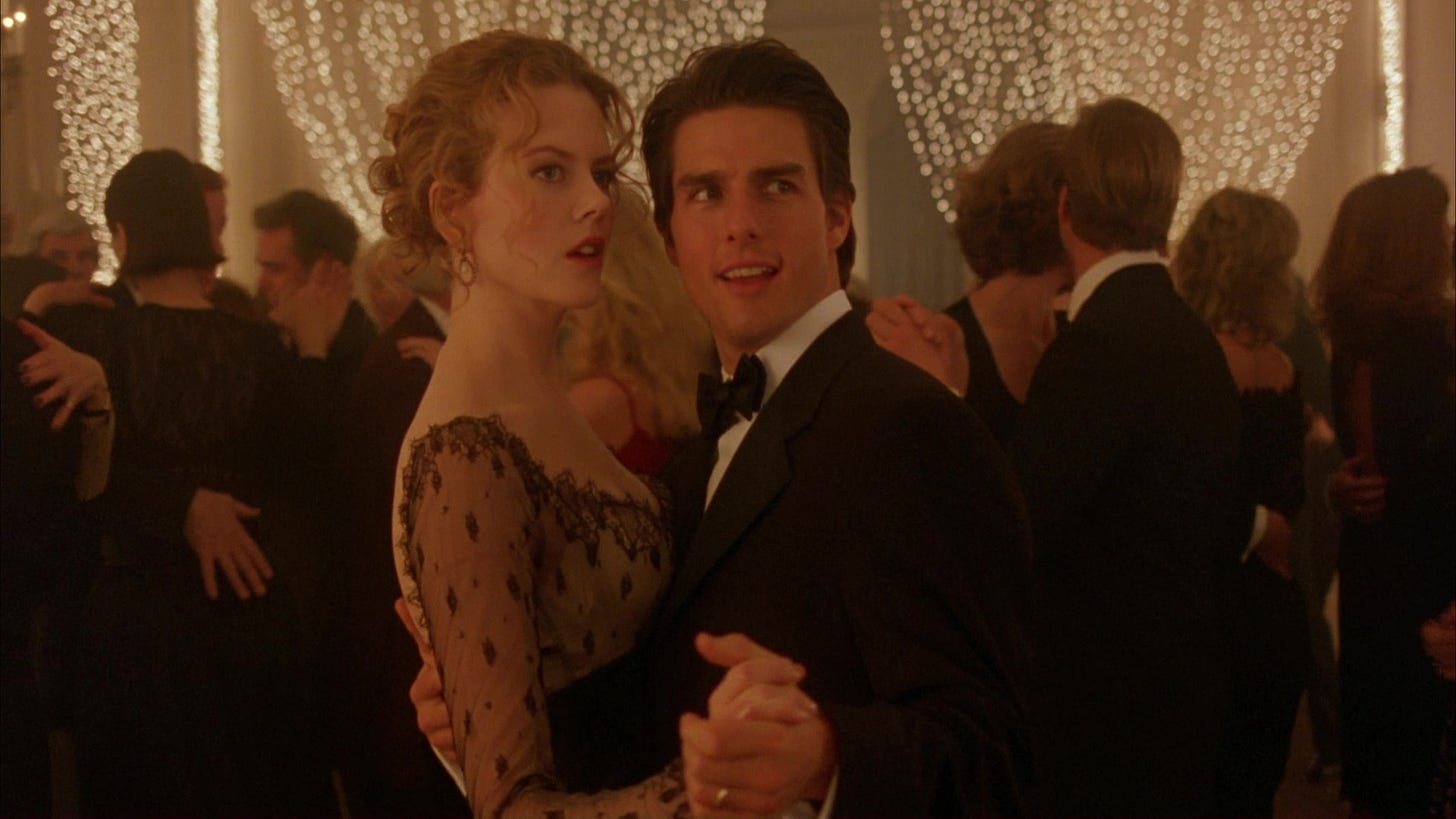
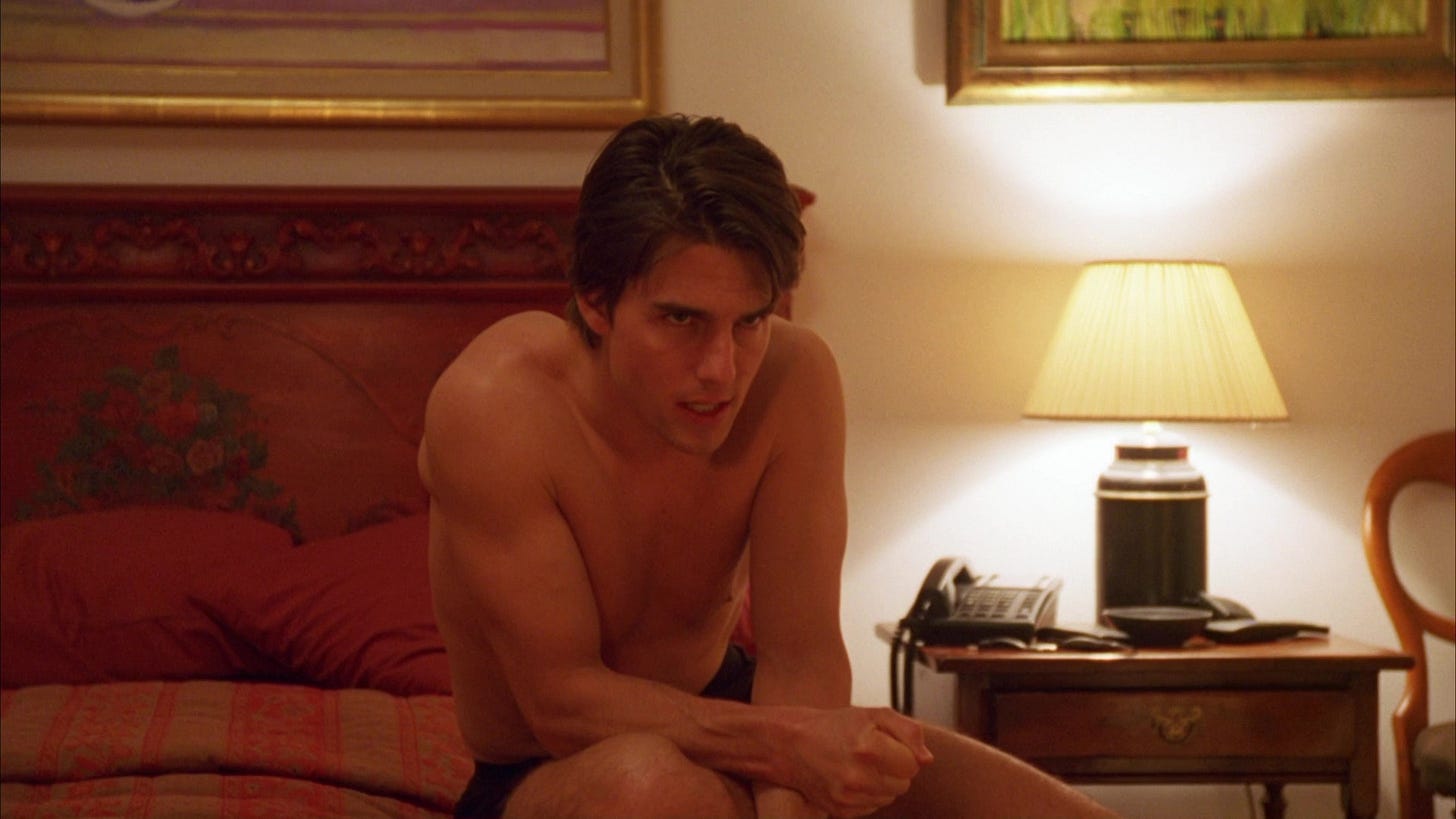

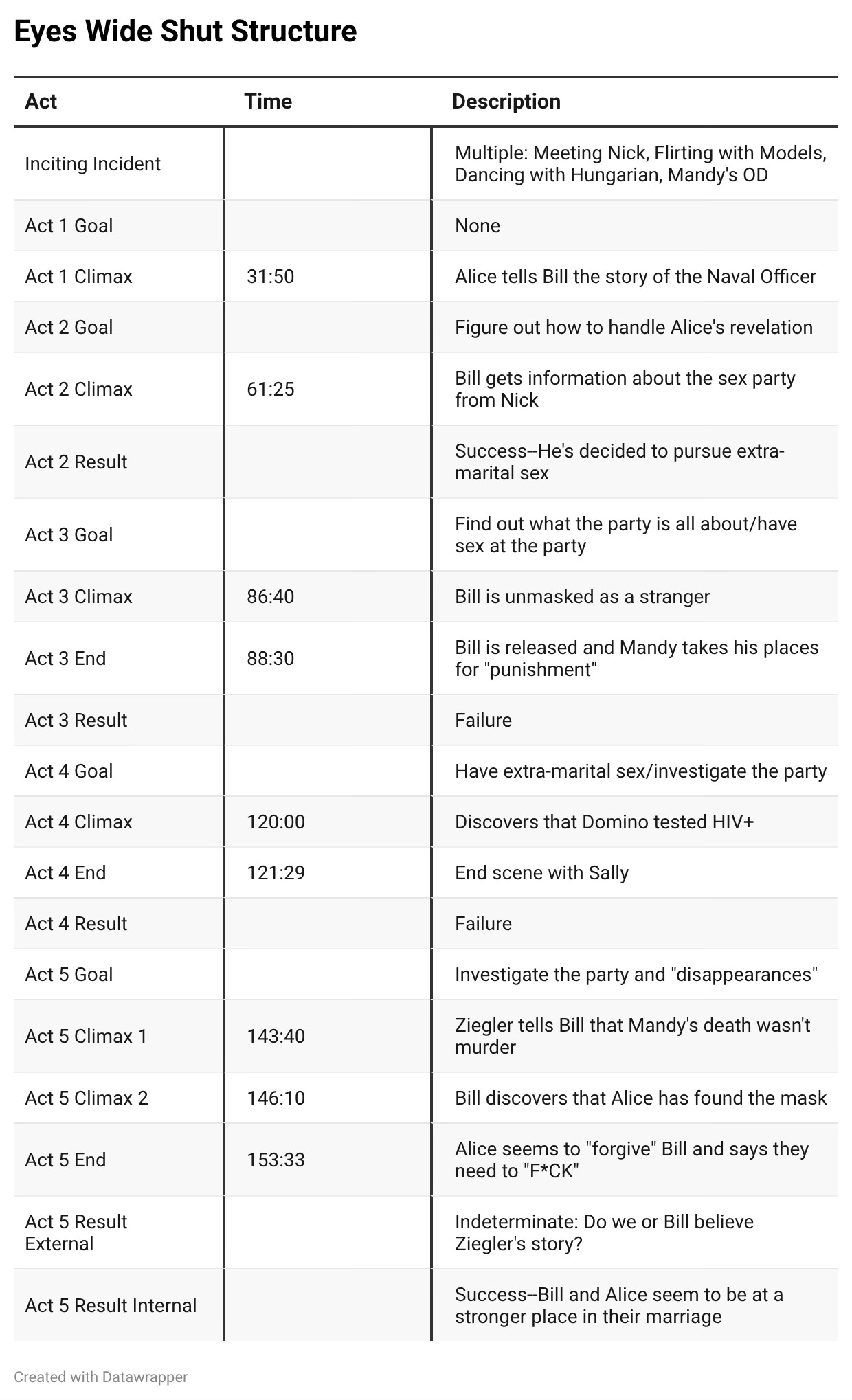

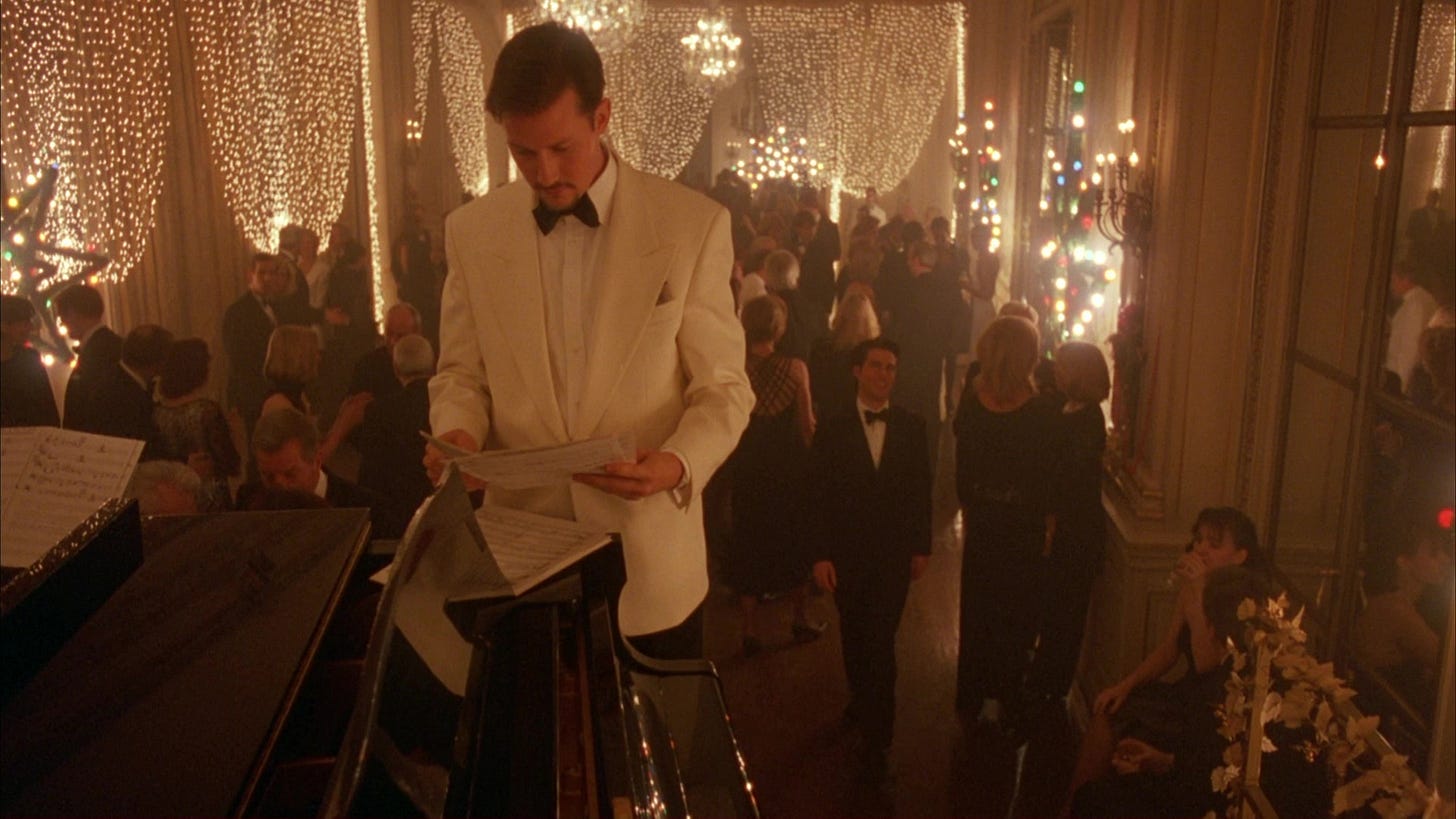


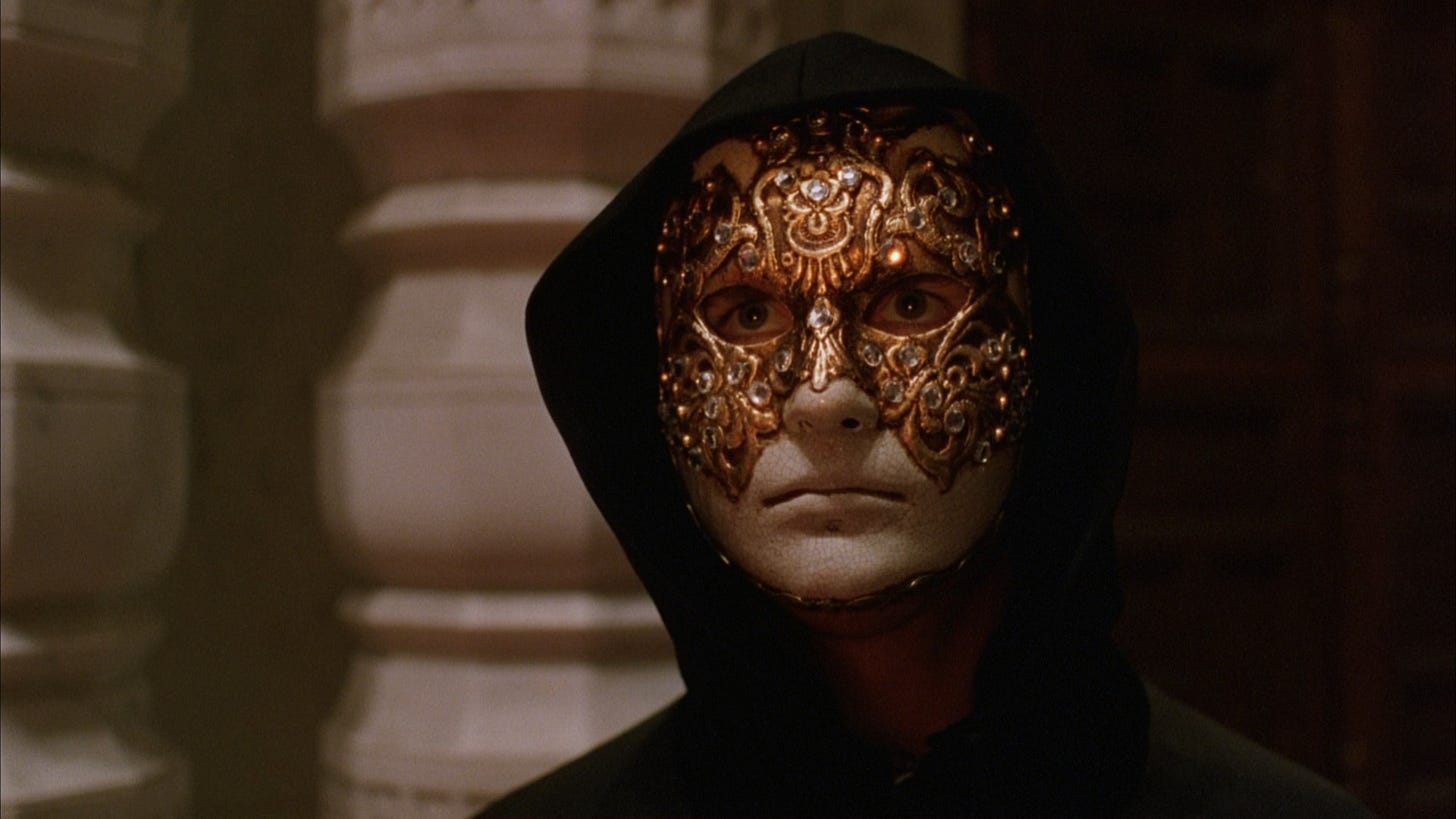
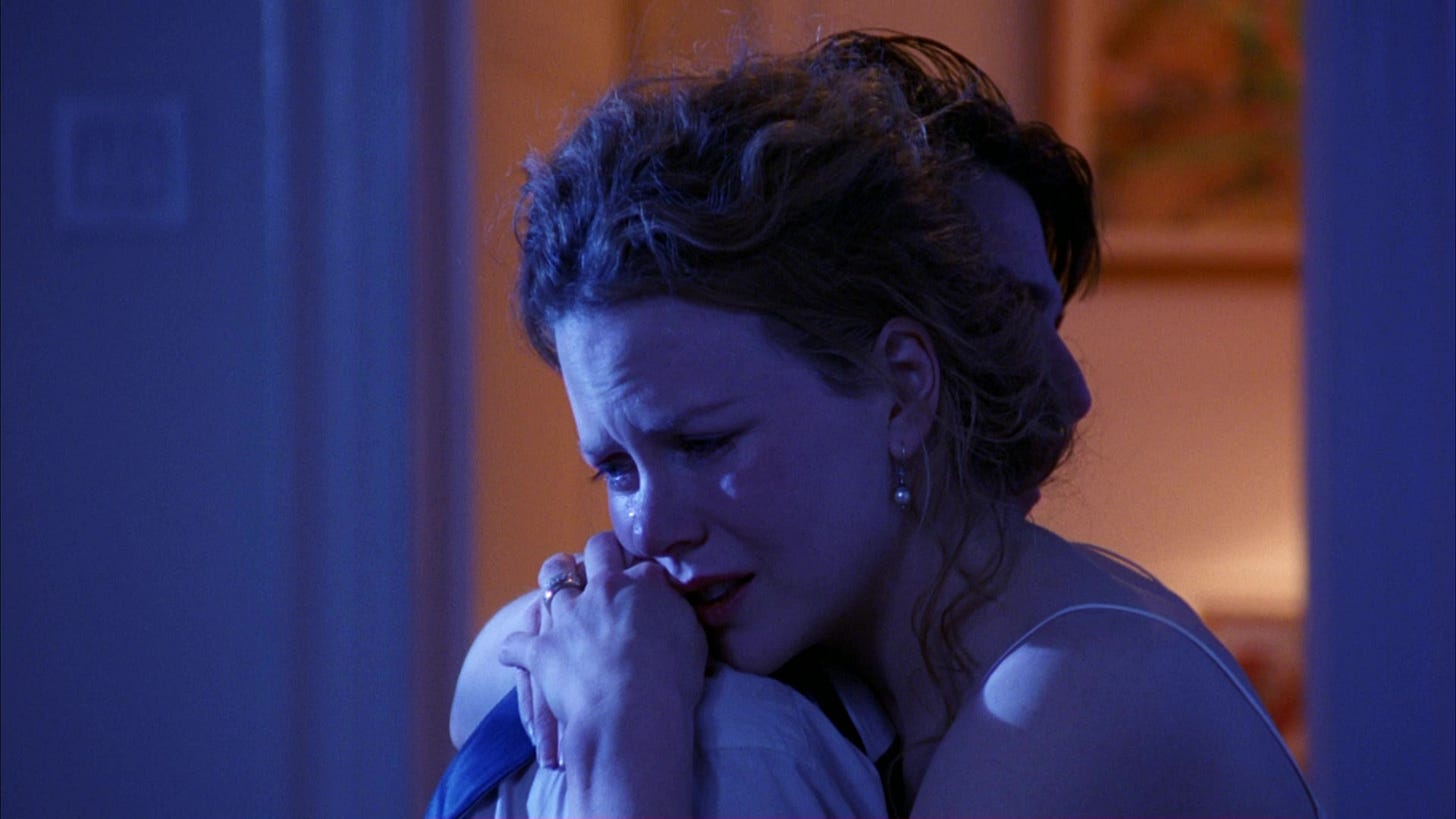

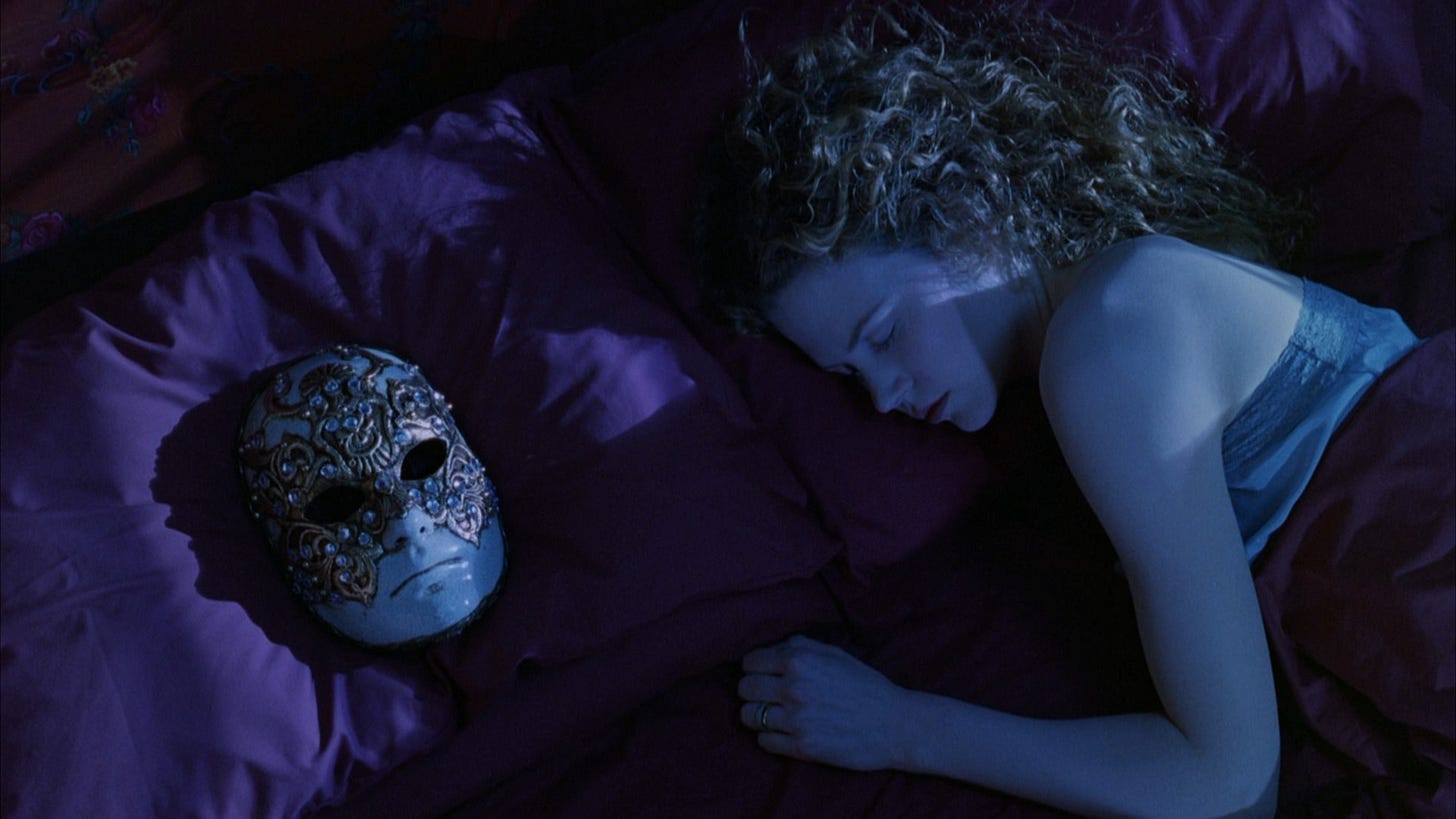
Wow! It sounds like you have had an insane and difficult life growing up. I'm so sorry that you experienced so much trauma, but also heartened by the fact that you seemed to have survived it, and even more that you're willing to go back and reconsider the things from your past that you once rejected. I don't know what you'll find in this film, and whether you'll end up liking it or not, but overall I find it both pessimistic at the societal level and optimistic at the personal level (even if its rich people lol). But whatever you find, I'm glad my breakdown helped you on the journey!
Aloha from Hawaii. Hi Bruce. I really appreciate this. I saw this when it first came out. I was about 22. I thought it was boring, stupid and didn't care about a story plot of a couple cheating and having orgies. I was also completely brainwashed by hollywood and was on my way to a Disney/Broadway career, which didn't actually happen until 2001. (I endured all the things that cabal children endure. Abuse. SA. SRA. But remember, I was brainwashed. I thought abuse was normal. I grew up indirectly in all kinds of perverse secret society shit, but had no idea what was happening. And I wasn't rich so my childhood was not like this movie in any way. Evil, but different. I was living my dream as the little drummer girl at Disney, until one day someone showed me subliminal programming and sex objects in the very Disney flicks I was promoting. Thus began my awakening).
Anyways, since I never paid attention at all to the movie, knowing what I know now, and armed with 20+ decades of occult and elite programming symbolism education, I am ready to watch the movie again. I'm watching a pirated version with no closed captions, and I can't understand or hear anything they are saying. So I was like FFS I have to find some reviews and articles to get what the hell they are saying. And here I am. So THANK YOU!